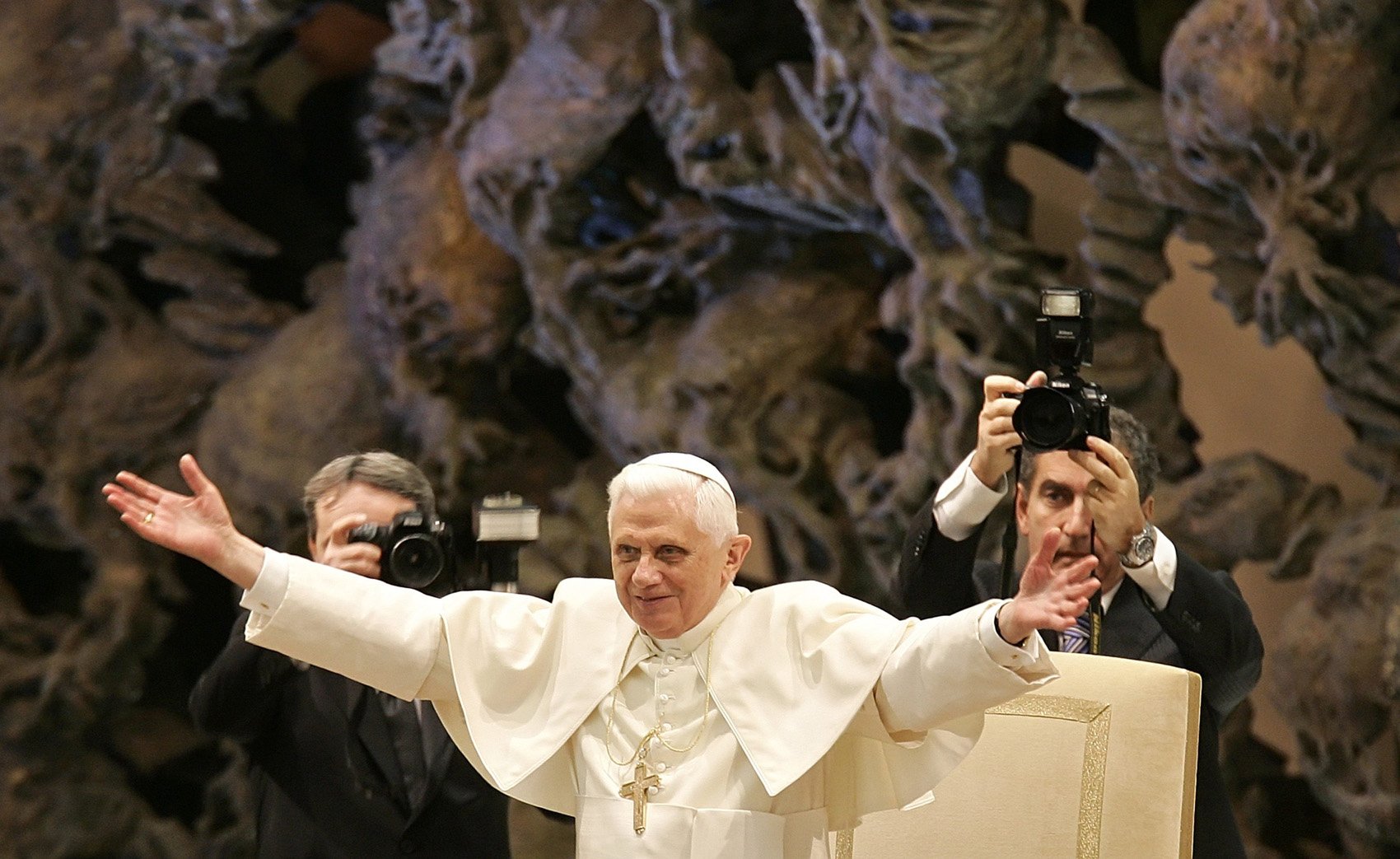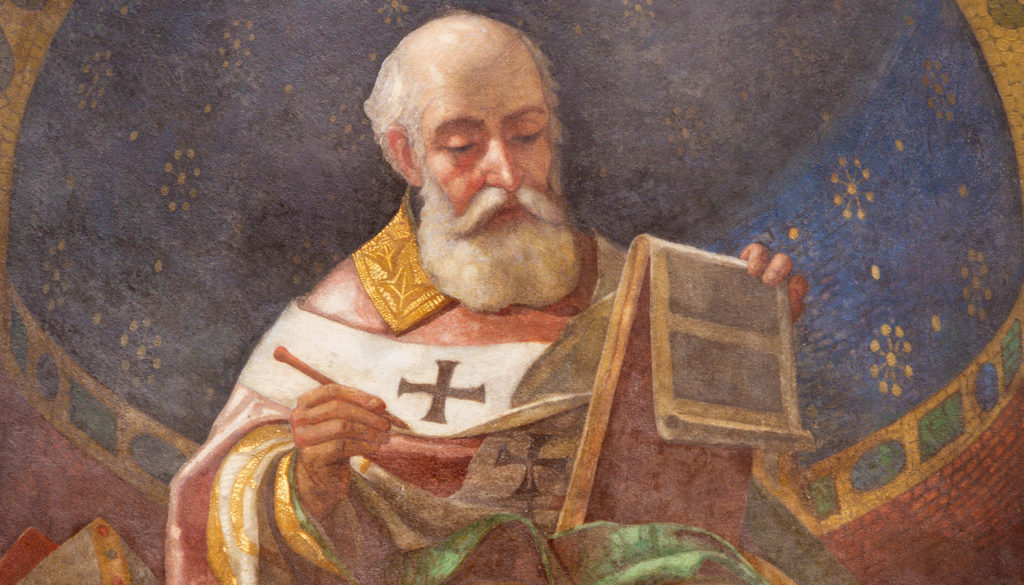No one in the history of the Church has done more to bring the early Church Fathers to a vast public than Pope Benedict XVI.
To do this, he took full advantage of the bully pulpit that is the papacy. In March 2007 — after completing a series of audience talks on the great figures of the New Testament — he launched a new series on the Fathers. He would continue this series, with weekly installments, for more than two years.
In each talk he gave an overview of the life and work of one of the Fathers. Most of the Fathers were in the spotlight just once. Some, however, required longer treatment and occupied the pontiff’s attention for several successive weeks. St. Augustine got five weeks!
The content was obviously well prepared, but what delighted the crowds at these Wednesday assemblies was Benedict’s delight in talking about the Fathers. His voice was animated. He sometimes seemed about to rise out of his chair. And he rarely looked down at his prepared text.
In 2008, the Vaticanologist Sandro Magister took the trouble to compare the prepared texts with film of the talks actually delivered by Benedict. He noticed that there were significant differences — not mere discrepancies, but long digressions added spontaneously and delivered with passion.
Afterward, the Vatican delayed publication until they could square the text as it had been prepared with the text as it was delivered.
The pope’s enthusiasm was visible, and it was infectious. Publishers throughout the world collected his reflections on the Fathers into books. In the United States, these editions came out from both Catholic and Protestant publishers.

Joseph Ratzinger’s love for the Church Fathers was lifelong. He came of age just as Catholicism in Europe was enjoying a “return to the sources.” Scholars and churchmen were experiencing a renewed interest in the Bible, the liturgy, and the Fathers — the great teachers of the earliest Christian centuries. In France arose the great scholars Jean Danielou and Henri de Lubac. In Germany were giants like Hugo Rahner, Erik Peterson, and Johannes Quasten (who fled the Nazis and found refuge at Catholic University of America).
The young Ratzinger felt drawn to these “sources” as he began his studies. In 1953 he earned a doctorate in patristics — the study of the Fathers — as he completed his dissertation, “The People and the House of God in Augustine’s Doctrine of the Church.”
As an academic, he taught courses on the Fathers. As a priest, he preached on them. As an intellectual, he made friends with others who shared his interest. In memoirs he spoke of the Lutheran scholar Paul Hacker, whose “passionate temperament knew no bounds” and who “would spend whole nights with one or more bottles of red wine in conversation with the Fathers.”
After Pope John XXIII summoned the Second Vatican Council in 1962, Father Ratzinger attended the sessions as a “peritus,” a theological adviser, to Cardinal Joseph Frings of Cologne, Germany.
Presented with drafts of the council documents, Ratzinger was sharply critical of what he saw. What he missed was the Bible and the Fathers. In later memoirs he wrote: “It is true the documents bore only weak traces of the biblical and patristic renewal of the last decades, so that they gave an impression of rigidity and narrowness through their excessive dependency on scholastic theology.”
He wrote up a detailed critique, and Cardinal Frings simply passed it on to the authorities as his own. He didn’t even bother to have it retyped.
As the sessions of Vatican II went on, one of Ratzinger’s jobs was to find material from the Fathers to support the teachings of the council documents.
Afterward he returned to academia, studying and teaching the Fathers, and establishing a reputation as one of the more brilliant theologians of his time.
The Fathers appear often in his work. He spoke especially of their ecumenical value, since they belonged to a time long before the Protestant Reformation and were claimed as authorities by Martin Luther, John Calvin, and John Wesley.
The Fathers, Ratzinger wrote, “were the theological teachers of the undivided Church; their theology was, in the original sense of the word, an ‘ecumenical theology’ that belonged to all; they were ‘Fathers’ not only of a part but also of the whole and are, therefore, to be called ‘Fathers’ in a distinctive sense that is peculiarly their own.”
In his book “Principles of Catholic Theology,” first published in German in 1982, he strove to articulate the nature and extent of the Fathers’ authority and their relevance for modern Christians.
He saw the works of the Fathers as the Church’s response — its yes — to the revelation of God in Jesus Christ. “Scripture and the Fathers belong together as do word and answer. … The word is always first; the response, second.”
Thus, the Fathers are essentially different from the Bible. But they are important in a secondary way, as witnesses to the Gospel’s earliest reception and interpretation.
For Ratzinger this was more than a merely antiquarian interest. He said, “Working with the Fathers is not just a matter of cataloging in a museum dedicated to what has been. The Fathers are the common past of all Christians. And in the rediscovery of this common possession lies the hope for the future of the Church, the task for her — and our — present.”
Those who knew the work of Ratzinger were not surprised at the place the Fathers came to occupy in the teaching of Benedict. Nor were they surprised that he could not contain his passion whenever he spoke of these great teachers of an undivided Church.

